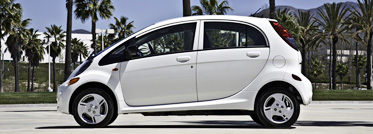
Report says one million annual EV sales by 2020.

Global electric-drive vehicle sales will jump from about 150,000 units next year to about 400,000 units in 2015 and to about 1.25 million units in 2020, according to an upcoming report by the respected Advanced Automotive Batteries consultancy, whose estimates project a slower growth rate than other research firms' forecasts. The Northern California company, headed by battery researcher Menahem Anderman, estimates that battery electric (BEV) and plug-in hybrid-electric (PHEV) vehicles will collectively account for about 1.5 percent of the 85-million unit global new vehicle market in 2020, or about one out of every 70 new cars sold, and will feed a lithium-ion battery market whose vehicle-based sales will jump to $11 billion in 2020 from $320 million last year.
Anderman, who recently discussed the upcoming report with Auto Observer, said executives at more than three-dozen major automakers and battery suppliers were interviewed for the report, which is scheduled to be published May 31. Advanced Automotive Battery's projections are more conservative than most others – Colorado-based Pike Research has annual global electric-drive vehicle sales passing the one-million mark in 2015, for instance, while the Center for Automotive Research in Michigan projected in January that in the U.S. alone, electric-drive vehicle sales will increase to about 140,000 in 2014 from about 30,000 this year. Anderman pegs that number at 135,000 in 2015.
The consultant argues that the electric-drive vehicle industry in the U.S. is being driven more by government subsidies and mandates such as California's zero-emissions vehicle requirements than by commercial demand. "While the future cannot be predicted, numbers much higher than our estimates are extremely unlikely," he told Auto Observer. "We do not consider our numbers conservative - rather, realistic."
Pricier Oil, Cheaper Batteries
In fact, oil would have to hit $150 a gallon while electric battery pricing would need to fall to less than $300 per kilowatt hour from about $800 for electric-drive vehicles to approach just 2 percent of annual sales by 2020. Anderman, in a January interview with Auto Observer, projected battery costs may fall to between $500 and $600 per kilowatt hour by 2015 as production expands and technology improves. The report projects that Japanese battery giants Sanyo Electric Co. and AESC - the joint battery-making venture of Nissan and NEC - each will sell about a half-billion dollars in lithium-ion battery packs for BEVs, PHEVs and conventional hybrid-electric vehicles in 2015. South Korea's LG Chem and Massachusetts-based A123 Systems will each sell more than $250 million in electric-powertrain battery packs that year, according to the report.
On the vehicle sales front, China will account for about half of the global annual BEV sales by the end of the decade, but as automakers in other countries increase production of battery-electric cars and trucks that share should fall to 33 percent by 2015, the report says. The U.S. will account for more than half of the global PHEV market in 2015, falling to about a third in 2020, according to Advanced Automotive Batteries. Plug-in hybrids – vehicles with gas or diesel engines as well as rechargeable electric-drive systems - are expected to do better than BEVs in the U.S. because Americans tend to drive longer distances and so far have shown a reluctance to embrace battery-only vehicles with limited range.
Like most analysts, Anderman expects the bulk of electric-drive sales to occur in Asia and Europe. Sales in the U.S. have been relatively slow so far, but automakers still are ramping up with higher production volumes and more new models expected in 2012 and beyond.
Written by Danny King